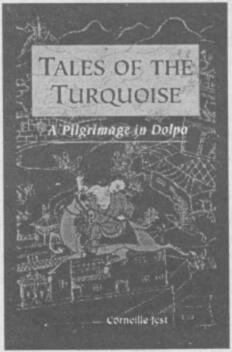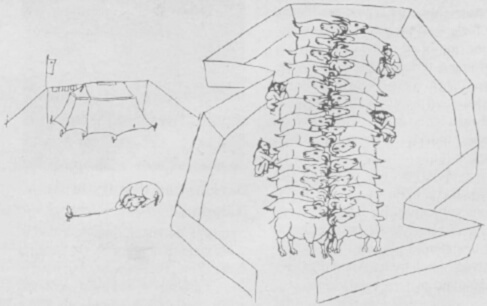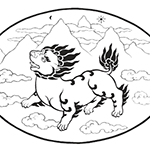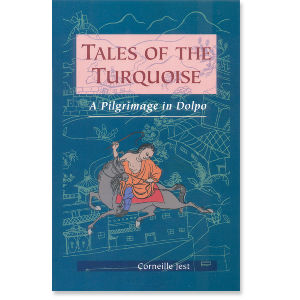| The following article is from the Spring, 1998 issue of the Snow Lion Newsletter and is for historical reference only. You can see this in context of the original newsletter here. |
Tales of the Turquoise
A Pilgrimage in Dolpo

In this journal narrative of a pilgrimage in Dolpo, an isolated Himalayan valley in northwest Nepal inhabited by people of Tibetan stock, Corneille Jest weaves together his own gentle observations of daily life and the lively tales told by his traveling companion.
In the early spring of 1960, Dr. Jest undertook a three-week circumambulation of the valley in the company of Tibetans, visiting temples, shrines and sacred mountains. His companion Karma, an elderly nomad from Western Tibet and a gifted story-teller, punctuated the journey with traditional tales and his own reflections.
Tales of the Turquoise is charmingly written, colorful and engaging it transports the reader to the timeless world of the Tibetan spirit not readily accessible to outsiders.
Dr. Corneille Jest, Director of Research at the Centre National de la Recherche Scientifique in Paris, specializes in social and economic change among populations living in harsh climates. He is particularly interested in the conservation of cultural heritage in the Himalayan and Central Asian regions.
Following is an excerpt from Tales of the Turquoise
Long, long ago, in Tibet, there lived a family who possessed much wealth, and bore the name of Gyachugpo, great richness. Their flock of sheep was looked after by a single shepherd, very pious. Before taking any food, he would always offer a little to his protective saint, Urgyen Rinpoche
One day, a man dressed in white appeared to him: Why have you not offered me a part of your food today? he asked.
I did not dare because I had only scraps left, by my master's guests, was the shepherd's reply.
I see that you are pious and good; offer me something every day, even if it is only scraps. It is the intention that counts. Now I would like to do something for you. What would you like?
The shepherd, who loved nature and all the things of the earth, reflected, then said: I would like to understand the language of animals.
So be it, said Urgyen Rinpoche, for indeed it was he. I give you this power.
When evening came, the shepherd returned home and put the flock in the enclosure. However, his master decided to celebrate the festival of the Tenth Day by slaughtering a fat ewe, a mamo. The next day, the shepherd, led his animals to the pasture and as he could now understand the language of the animals, this is what he heard:
Bee. (This was the word of the mother.)
Mee. (This was the word of the lamb.)
Tomorrow, don't walk at the front of the herd; don't be greedy and don't go up too high or the wolf will eat you, the mother warned. And don't stay in the rear, the shepherd will throw stones at you with his sling.
Mama, where will you go tomorrow? asked the lamb.
Tomorrow, the master will kill me and offer my flesh to his guests, said the mother. This is the reason for which I give you this advice: don't walk ahead of the flock, nor at the rear.
The shepherd understood these words, and asked himself what to do? In the evening he returned, very sad. To save the life of the ewe, he fled, taking with him the mother and her lamb.
Along the road, he met a horseman followed by a colt. The horseman was speeding his mount.
Mother, wait for me! said the colt.
Little tigi, go slowly, a needle wounds me in my side. It is concealed in the saddle carpet.
The shepherd understood these words and stopped the horseman.
Stop and dismount from the saddle, you are wounding your horse, he said.
You stop me at the time my father is about to die! I am on my way to look for a doctor and a lama.
Inspect the seam of your saddle carpet before you continue on your way, the shepherd insisted.
The horseman looked and found there a needle that he had forgotten to take out and he thought to himself, This man is a lama or a magician!
Please come with me, you will know how to cure my father. Come! he begged.
I am not a lama, I haven't any power, the shepherd replied.
You understand the language of the animals, so come! again begged the horseman.
The shepherd was thus compelled to follow the horseman.
In the house, the shepherd said to himself, How am I to convince this man that I am neither a lama nor a doctor?
Now in this house, there was a cat and three kittens. The horseman had offered a plate of meat to the shepherd and the mother cat said to her kittens: Wait a little, I am going to ask this lama for some of this meat.

This lama, what has he come to do here? asked a kitten.
Our master is ill. The lama has come to take care of him, the mother answered.
What is our master suffering from? asked the kitten.
Our master suffers from this: he has some ants in his ear.
And the shepherd understood all these words!
And to cure him, what must be done? asked the second kitten, who was curious.
It is necessary to gather the most beautiful flowers of the mountain; put them near the ear, sprinkle them with some water and some milk; then beat the little cymbals, tingsha, and in this way, the ants will think, It's spring, the fragrance of the flowers is fresh and strong; it rains, the thunder growls, and the ants will come out of the ear.
The shepherd understood all this and in gratitude, gave the whole plate of meat to the mother cat. Then he went to gather the most beautiful flowers and followed the cat's words. He asked the master of the house for a vessel filled with some water, some milk, and for the little cymbals tingsha. Then, he murmured, Mamoma, Mamamar, for he didn't know any prayer and he spoke as he would speak to his sheep.
The ants thought, Well, it rains, the flowers are blooming; it's spring-time! One of them came out of the ear and called to the others.
The master of the house recovered immediately. To say that I have spent so much money in ceremonies, appealing to the lamas and the pious for a cure that was so simple! he said to himself and he gave his house, his field and his flock to the shepherd who understood the language of the animals.
$22.95 - Paperback


